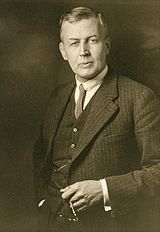J.J.L. Duyvendak
| J.J.L. Duyvendak | |||||||||
|---|---|---|---|---|---|---|---|---|---|
 |
|||||||||
| Born |
28 June 1889 Harlingen, Friesland, Netherlands |
||||||||
| Died | 9 July 1954 (aged 65) Leiden, Netherlands |
||||||||
| Academic advisors |
J.J.M. de Groot Édouard Chavannes Henri Cordier |
||||||||
| Notable students | A.F.P. Hulsewé | ||||||||
| Chinese name | |||||||||
| Traditional Chinese | 戴文達 | ||||||||
| Simplified Chinese | 戴文达 | ||||||||
|
|||||||||
| Transcriptions | |
|---|---|
| Standard Mandarin | |
| Hanyu Pinyin | Dài Wéndá |
| Wade–Giles | Tai4 Wen2-ta2 |
Jan Julius Lodewijk Duyvendak (28 June 1889 – 9 July 1954) was a Dutch sinologist and professor of Chinese at Leiden University. He is known for his translation of The Book of Lord Shang and his studies of the Dao De Jing. He was co-editor of the renowned sinology journal T'oung Pao with French scholar Paul Pelliot for several decades.
J. J. L. Duyvendak was born on 28 June 1889 in Harlingen, Netherlands. He matriculated into Leiden University as an undergraduate where he studied philology, and was soon introduced to Chinese by Dutch sinologist J.J.M. de Groot. In 1910 Duyvendak moved to Paris where he began more advanced studies in Chinese under Édouard Chavannes and Henri Cordier. From 1912 to 1918, Duyvendak worked as an interpreter at the Dutch embassy in Beijing before gaining a position at Leiden University in 1919. During World War II, Duyvendak worked to protect Jews living in the Netherlands from Nazi forces.
Duyvendak became a member of the Royal Netherlands Academy of Arts and Sciences in 1931.
In 1942, Duyvendak published one of the first articles in a Western language on the Crab Nebula supernova as observed by Chinese astronomers in 1054 during the Song dynasty.
...
Wikipedia
